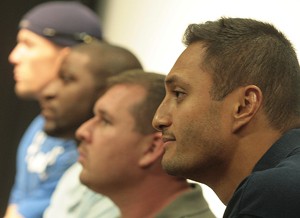Rahn Johnson, 26, woke up, got dressed and looked out across the desert.
Like many UA students, Johnson would spend his day interacting with others and trying to get though the day under the hot sun.
This was in 2003, and Johnson, a speech and hearing sciences junior, was not looking out over the Sonoran Desert – but the Iraqi desert.
Today, Johnson and many other veterans are trying to reinvent themselves – not as solders, but as students. “”In 2003, I was deployed to Iraq,”” Johnson said. “”I was 20 years old at the time, and I was a part of the initial invasion, and (now) I am a disabled veteran and I am a student here at the UA.””
Amanda Kraus, program coordinator for the Veterans’ Reintegration and Education Project, said that it is extremely important for veterans to have a chance to get an education after their military service has ended.
“”On one hand, I think that vets are really high profile, and on the other hand, nobody knows anything about them,”” Kraus said. “”There is this weird disconnect, and there are more and more veterans that are coming back, and they want to use their GI Bill (of Rights). They want to take classes, and higher education needs to get with the program and learn about these students, or we are not going to be able to serve them effectively.””
It is a major task to go from being a member of the armed forces to adjusting to civilian life, Johnson said.
“”It is a daily struggle, to be quite honest with you. I think about some of the things that happened when I was in Iraq – I was a combat medic,”” Johnson said. “”You just have to take it day by day, being at school and getting an education, which I really wanted to do. It kind of takes my mind off it a little bit.””
Dan Standage, a special education senior, served 10 years in the Marines and said that it is one thing to adapt to being a civilian, but it is another when you are a disabled veteran.
Standage, 34, said that during the end of his service, he began to notice that he was losing his vision, and he knew that he would eventually have to look at other career opportunities.
“”My parents weren’t, I wouldn’t say, uneducated, but education wasn’t spoken about in our house,”” Standage said. “”My dad graduated high school. My mom had an 8th grade education, and at the ripe old age of 17, I graduated high school and I left for the military.””
As he transitioned from military life to civilian life, Standage said that he faced several obstacles along the way.
“”I can’t order my books online,”” Standage said. “”I can go out there, and literally, I can put them into the system, on the Web. And I can select all my books for my classes and get all the way to the end, but because the (U.S. Department of Veteran Affairs) is paying for it, I cannot put it on the Bursar’s account, and I can’t put it on my card because I won’t be reimbursed for it.””
Since the new Veterans Education and Transition Services office opened at the start of the school year, Standage said that he has experienced much more camaraderie among veterans on campus.
“”I couldn’t find anybody (when I first got here),”” Standage said. “”I never could find a veteran. I found one instructor, and that was last semester and then I kind of stumbled on the whole vets initiative. Now I run into people all of the time in classes, and I bond with them now.””
Gerard Ah-Fook, a 31 year-old pre-business freshman, served in the Navy for four years and is currently in his first semester at the UA. He said that he always enjoys listening to 18- and 19-year-olds stress out about what they have going on in their lives.
“”Having some life experience and being through some tough times, I can smile when I hear complaints about things being too hard or being too much of a workload, things being too stressful,”” Ah-Fook said. “”I feel like this life – it makes me laugh inside when I hear someone use the term ‘when you get out in the real world.’ People use that in the military.””
Johnson, who suffers from post-traumatic stress disorder, said that the hardest part about switching to civilian life has been realizing that you may no longer be like everyone else.
“”Whenever you come back, there is a kind of a macho-ism,”” Johnson said. “”You don’t want to say that you have anything wrong with you. It is expected that nothing is wrong with you, and so if something is wrong with you, it is sort of a disciplinary problem. It’s related to a war.””
Hopefully, the UA’s program to integrate veterans into academia will begin to catch on at other four-year institutions, Kraus said.
“”I think if they know that a large public four-year institution has programs and services in place to help their transition, has people willing to offer individualized service and pay attention to them – I think that will definitely help,”” Kraus said.









